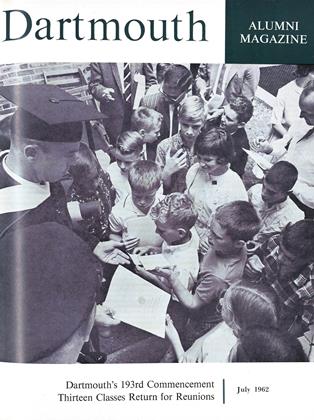SEVENTY-TWO men who received the M.B.A. degree at the commencement exercises of Tuck School on Sunday, June 3, were told that "morality and old-fashioned ethics" are still a vitally necessary part of business if it is to achieve self-development and make its contribution to the survival of the free world.
Sigurd S. Larmon '14, chairman of the board of Young & Rubicam, one of the nation's biggest advertising agencies, also told the business school graduates that developments in world trade will give them problems of almost complete novelty to solve in the years ahead. Competition in a free world market while maintaining this country's high standard of living, the raising of living conditions in underprivileged nations, and the creation of fourteen million new jobs in the U.S. alone in the next decade were cited by Mr. Larmon as some of the great challenges facing American businessmen. The subject of his commencement address was "The Role of the Businessman in the Years Ahead."
President Dickey awarded the Masters' degrees to the Tuck School graduates who were presented by Dean Karl A. Hill '38. One of the graduates, Stuart Mac Donald of Weston, Vt., received his degree with highest distinction and was the winner of three of the eight awards presented annually by the school. MacDonald, a 1957 engineering graduate of Cornell, was awarded the Herman Feldman Memorial Prize, the Walter A. Jacobs Memorial Prize, and the American Machine & Foundry Company Scholarship.
Dennis M. O'Connor '61 of Haddon Heights, N. J., who graduated with high distinction, received the James A. and Sabra M. Hamilton Prize in Administration. David E. Clark '61 of Old Orchard Beach, Me., who received his degree with distinction, won the Charles I. Lebovitz Memorial Award and the Gulf Fellowship in Business Administration.
Daniel C. Tracy '61 of Marblehead, Mass., was given the Haskins and Sells Foundation Award, and Richard B. Lefcort '61 of Los Angeles, Calif., received the Allied Chemical Corporation Fellow-ship.
The prize awards were made by George P. Drowne Jr. '33, who is director of admissions and student personnel at Tuck School.
Dean Hill in his remarks recalled that in 1901 Tuck School gave the first four Masters' degrees in business administration in this country.
 View Full Issue
View Full Issue
More From This Issue
-
 Feature
FeatureOn Being a Full Man
July 1962 By ARTHUR H. DEAN, LL.D. '62 -
 Feature
FeatureThe Diminishing Citizen
July 1962 By BASIL O'CONNOR '12 -
 Feature
FeatureHONORARY DEGREE CITATIONS
July 1962 -
 Feature
FeatureThe Reunion Week
July 1962 -
 Feature
FeatureFive Alumni Awards Conferred
July 1962 -
 Feature
FeatureStrickland Heads Alumni Council
July 1962







